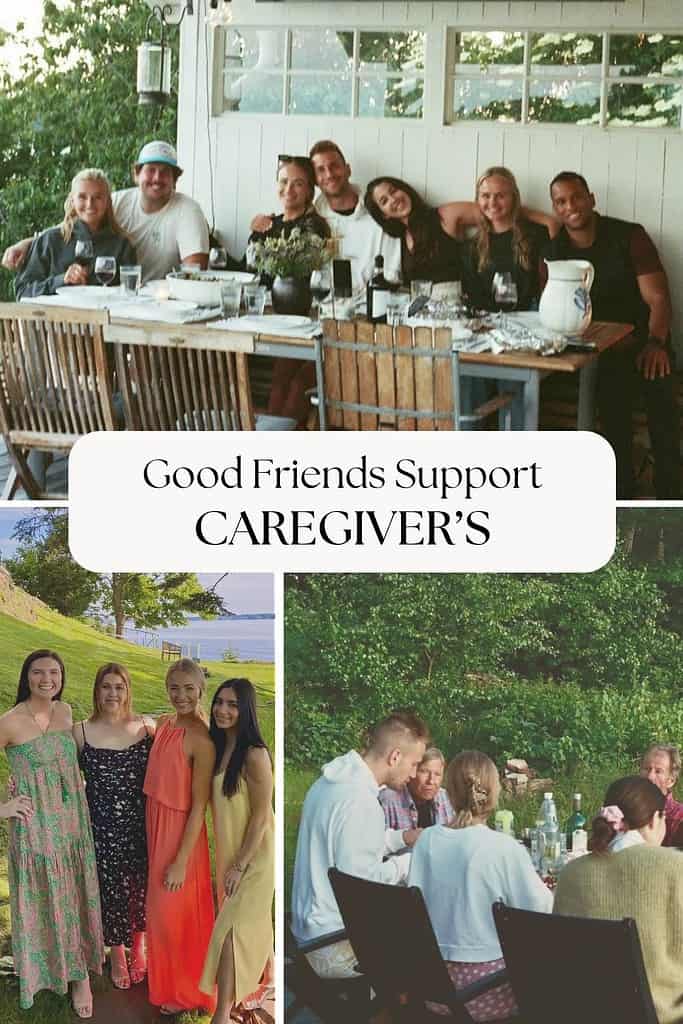Find Good Friends To Support You As A Caregiver
Discover the invaluable support good friends offer caregivers, transforming challenges into shared moments of strength and resilience.

Good friends are incredibly important for caregivers as they can provide much-needed emotional support and understanding amid challenging responsibilities.
Healthy friendships provide companionship and empathy, and they help caregivers feel less alone. Close friends can also offer the caregiver solace and strength throughout their caregiving journey.
Having a lot of friends is not necessary to feel supported as a caregiver. When it comes to true friendship, quality matters more than quantity.
I value the strong friendships I made during my time as a nurse in the hospital and later, as I embraced the role of caregiver for Doug, who is living with Parkinson’s. While I may not look for a lot of friends, having a select few who mean the world to me, and who support me daily, aligns with my personality.
These genuine and resilient friendships have been a wonderful support. Guiding me not just through the challenging and tough times of caregiving but also throughout my entire life journey.
What Is A Good Friend?
The term “good friends” typically refers to individuals who are supportive, trustworthy, and caring. These friends are reliable, and understanding, and contribute positively to our lives.
Good friends offer emotional support, share mutual respect, and may be counted on during both good times and bad times.
The term “good friends” implies a strong and positive connection, characterized by empathy, shared values, and a sense of mutual understanding and companionship.
The Role Of Good Friends In Caregiving
When it comes to caregiving, having the support of good friends can be very helpful.
Whether assisting with practical tasks or simply offering a comforting presence, good friends play an important role in lightening the burden of caregiving, making the journey and challenges more manageable.
The impact of having good friends extends beyond just the context of caregiving. The benefits of friendships influence the overall well-being and quality of life for both caregivers and their caregiver recipients.

10 Important Characteristics Of Good Friends
Developing meaningful relationships takes time, and it involves recognizing characteristics that contribute to a strong connection and years of friendship.
Here are 10 important characteristics to look for when looking for new friends and forming strong relationships.
1. Empathetic
A good friend ideally understands and shares your feelings. They provide emotional support and connection.
2. Trustworthy
Best friends are people we rely on and can share personal and confidential information, knowing that our privacy will be respected. Trust is the basis of a great friendship, and is an unspoken understanding between old friends.
3. Reliable
Reliable friends are consistent and dependable. They are people we can count on in both good and challenging times.
4. Respectful
Good friends value each other’s opinions, boundaries, and individuality. Mutual respect is the cornerstone of any good friendship.
5. Good Listener
Good friends are active listeners and genuinely interested in what we have to say. They pay close attention and are ready to offer support without harsh judgment or criticism.
6. Positive
Positive friends contribute to a healthy and uplifting environment. They inspire and encourage rather than bring negativity into the relationship.
7. Shared Values
Friends who share similar interests and values create strong bonds, and the shared beliefs help to make the friendships meaningful and lasting.
8. Honest
Open and honest communication is important, and an excellent friend is honest and truthful. This transparency helps to support a trustworthy friendship.
9. Present
Good friends are available to each other. Although it is not about the quantity of time spent together, a good friend will make an effort to be available and present when needed.
10. Supportive
Good friends celebrate each other’s successes and disappointments. They actively support each other’s well-being and encourage personal growth within their friendship.

Building And Strengthening Friendships
While building and strengthening friendships is important for everyone, as a caregiver, it becomes crucial in helping to establish a strong support network.
A great way to build and nurture a strong friendship is to prioritize time together, engage in open and honest communication, and express gratitude for the historic friendship you have together.
Some of the most important things contributing to the ongoing growth and resilience of a friendship are consistency, authenticity, and a willingness to invest time and energy into the relationship.
These are key elements to building and maintaining a strong and lasting friendship.
Seeking Out New Friendships
Seeking out new friendships can be challenging, especially for caregivers with demanding schedules and limited opportunities to step away from home.
Here are some practical ideas for caregivers to connect with others, and hopefully develop meaningful friendships to support themselves on their caregiving journey.
Seeking out and building new friendships is a process and it can take time. Try to be patient, and do not get discouraged. You never know what one small gesture may bring.

The Impact Of Friendships On Caregiver Well-Being
Healthy friendships can have a profound impact on the well-being of caregivers. Sincere connections with friends are an emotional anchor that can provide a place where caregivers express their feelings, share their burdens, and receive empathetic support.
These friendships serve as a buffer against the emotional toll of caregiving, easing feelings of isolation and stress.
Friends become partners in the journey, helping with mental and emotional resilience but also helping to provide a sense of belonging and understanding.
The positive influence of having good friends can also contribute to a caregiver’s physical well-being. Caregiver stress often manifests as anxiety, high blood pressure, and other physical and mental health issues.
Having close friendships to share experiences, and engaging in social activities with friends acts as a therapeutic outlet, offering moments of joy and relaxation amid the challenges of caregiving.
The impact of friendships on caregiver well-being is significant, profoundly affecting both their physical and mental well-being.
Good friends and supportive relationships are part of a caregiver’s healthy support system. Ultimately helping them to better manage their all-important role as caregivers.
FREE GUIDE
If you are interested in more caregiver support, please check out this FREE resource guide.
Check Out These Additional Posts For Continued Caregiver Support
Let’s Connect
If you enjoyed this article, I would love for you to share it with friends and family members, or anyone you think might benefit from reading it.
Please let me know your thoughts in the comment section below. I’d love to hear from you.




Dawn,
This is great! Supportive friends are so key. Thanks for this!
Yes they are, and you are most welcome!
Dawn… love this article on friends, not only for and as caregivers, but in general. Thanks for posting! ♀️❤️
Awhhh thank you so much Brenda, and yes, so true, friends are needed – period.